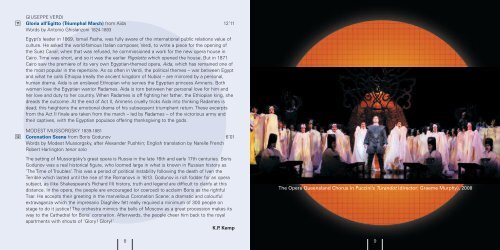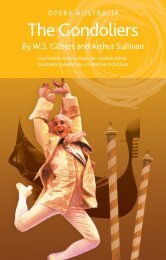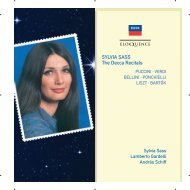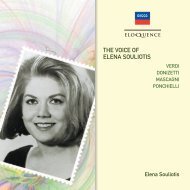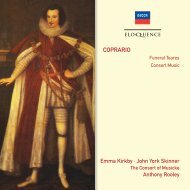Opera Choruses Booklet - Buywell
Opera Choruses Booklet - Buywell
Opera Choruses Booklet - Buywell
You also want an ePaper? Increase the reach of your titles
YUMPU automatically turns print PDFs into web optimized ePapers that Google loves.
GIUSEPPE VERDI<br />
! Gloria all’Egitto (Triumphal March) from Aida 12’11<br />
Words by Antonio Ghislanzoni 1824-1893<br />
Egypt’s leader in 1869, Ismail Pasha, was fully aware of the international public relations value of<br />
culture. He asked the world-famous Italian composer, Verdi, to write a piece for the opening of<br />
the Suez Canal; when that was refused, he commissioned a work for the new opera house in<br />
Cairo. Time was short, and so it was the earlier Rigoletto which opened the house. But in 1871<br />
Cairo saw the premiere of its very own Egyptian-themed opera, Aida, which has remained one of<br />
the most popular in the repertoire. As so often in Verdi, the political themes – war between Egypt<br />
and what he calls Ethiopia (really the ancient kingdom of Nubia) – are mirrored by a personal,<br />
human drama. Aida is an enslaved Ethiopian who serves the Egyptian princess Amneris. Both<br />
women love the Egyptian warrior Radames. Aida is torn between her personal love for him and<br />
her love and duty to her country. When Radames is off fighting her father, the Ethiopian king, she<br />
dreads the outcome. At the end of Act II, Amneris cruelly tricks Aida into thinking Radames is<br />
dead; this heightens the emotional drama of his subsequent triumphant return. These excerpts<br />
from the Act II finale are taken from the march – led by Radames – of the victorious army and<br />
their captives, with the Egyptian populace offering thanksgiving to the gods.<br />
MODEST MUSSORGSKY 1839-1881<br />
@ Coronation Scene from Boris Godunov 6’01<br />
Words by Modest Mussorgsky, after Alexander Pushkin; English translation by Narelle French<br />
Robert Harrington tenor solo<br />
The setting of Mussorgsky’s great opera is Russia in the late 16th and early 17th centuries. Boris<br />
Godunov was a real historical figure, who loomed large in what is known in Russian history as<br />
‘The Time of Troubles’. This was a period of political instability following the death of Ivan the<br />
Terrible which lasted until the rise of the Romanovs in 1613. Godunov is rich fodder for an opera<br />
subject, as (like Shakespeare’s Richard III) history, truth and legend are difficult to clarify at this<br />
distance. In the opera, the people are encouraged (or coerced) to acclaim Boris as the rightful<br />
Tsar. He accepts their greeting in the marvellous Coronation Scene: a dramatic and colourful<br />
extravaganza which the impresario Diaghilev felt really required a minimum of 300 people on<br />
stage to do it justice! The orchestra mimics the bells of Moscow as a great procession makes its<br />
way to the Cathedral for Boris’ coronation. Afterwards, the people cheer him back to the royal<br />
apartments with shouts of ‘Glory! Glory!’<br />
K.P. Kemp<br />
8<br />
The <strong>Opera</strong> Queensland Chorus in Puccini’s Turandot (director: Graeme Murphy), 2008<br />
9


